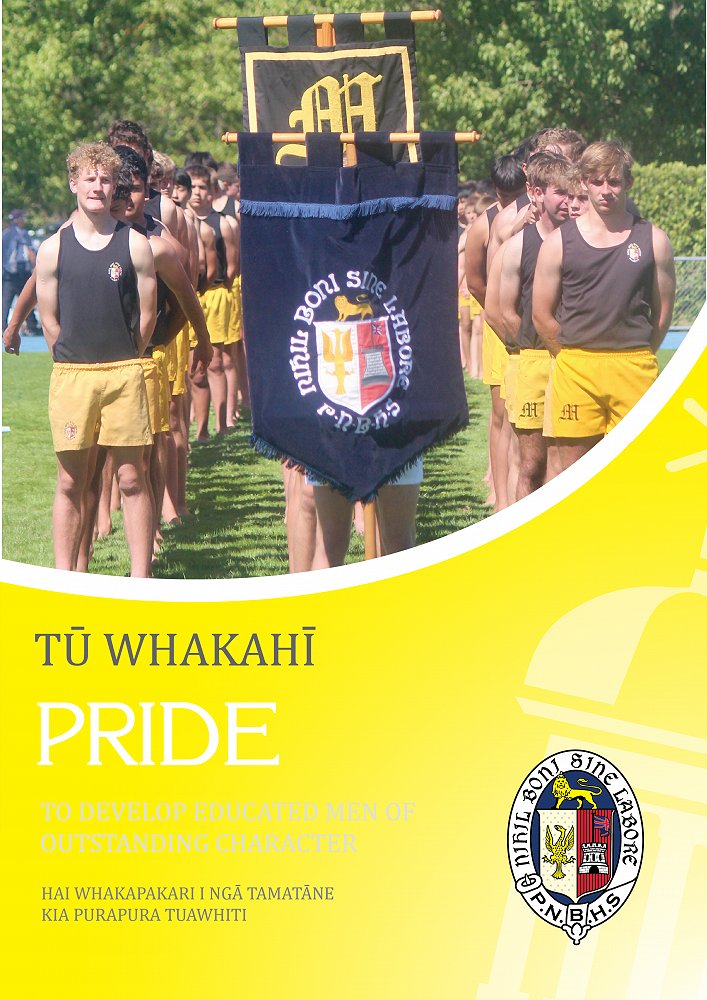From the Deputy Rector
Our approach to character education is heavily focused on virtue ethics - emphasising virtues, in this instance through our school values of Tū Māia | Courage – Ngākau Mahaki | Humility – Te mahi tahi | Industry – Tū Rangatira | Integrity – Tū Whakahī | Pride – Tū Whakaaute | Respect, as the foundation of moral character.
Tū Whakahī | Pride
In recent weeks we have focused upon the school value Tū Whakahī | Pride in our communication with young men and the wider school community. While we want to help your son develop a healthy sense of pride in himself, his whānau and his school, alongside other aspects of his life that are important to him, we are also conscious that excessive pride is a vice. This is what leads to Pride's place as one of the 'seven deadly sins'.
The Merriam-Webster's Dictionary provides two very different meanings of pride: (i) inordinate self-esteem/conceit, and (ii) a reasonable or justifiable self-respect. The difference between the two is strikingly obvious - one a character trait to be avoided, the other to be embraced.

In 'Pride: The Secret of Success' author and Professor of Psychology Jessica Tracy highlights the positive influence that comes from developing an appropriate sense of Tū Whakahī | Pride. She stipulates that "pride is one of the most important motivational forces propelling human achievement, creation and innovation." Furthermore:
Pride makes us care about how others see us and - just as important - how we see ourselves. It makes us want to feel good about ourselves...it prods us to figure out who we want to be and then to do whatever is needed to become that person. The desire to feel pride can consequently push us to work hard and strive for excellence.
The manner in which young men competed in the PNBHS Athletics Championships, the way they represented themselves and their clubs in the Marching competition, the positive interactions we see on a daily basis in classrooms, around school grounds and in co-curricular activities, and the effort with academic work are all examples of reasonable or justifiable forms of self-respect; the 'healthy' version of Tū Whakahī | Pride.

The effort made by so many young men in the annual School Road Race is likewise commendable. Competing in the Road Race provides different levels of challenge. For some, running this distance comes relatively easily, and their emphasis is on competing to gain the highest possible placing they can. For other young men, pushing themselves to complete the Road race in the best possible time - or for some, simply completing it - are challenges. All young men who completed the Road Race with genuine effort should be proud of their endeavours and feel a sense of justifiable self-satisfaction.
Professor Tracy also notes the impact that authentic pride - that which reflects progress and achievements one has had to genuinely strive for - can have on our resilience. It is inevitable that we will face challenges at different times and it is also inevitable that we will at times fail in whatever we set out to accomplish. People with authentic pride can put these challenges and failures into perspective: "They acknowledge them but treat them as temporary setbacks and are soon ready to tackle new goals." Furthermore, she notes that "authentic pride is the emotional response to successes that are hard won." When our achievements come too easily, or are based on luck rather than hard work, our sense of pride is quite different to those occasions when we have really had to work to achieve what we have.

Alongside some aspirational examples of our school values in action, such as those of Old Boy and former All Black Dr. Bob Burgess that are described further in this newsletter, we have also been intentional in highlighting 'every day' examples of acts of outstanding character. Recently Year 9 student Moses Fanoga was identified by Prefect William Hince after he assisted a motorist who had broken down near school. Moses' simple act of helping to move the car to safety at the side of the road was greatly appreciated and was a significant help in the 'heat of the moment'.
Community Service
Being involved in one's community builds belonging. Having a strong sense of belonging to all of the groups we are part of in our community - to our whānau, school, sports teams and cultural groups, and the wider community - is one of the fundamental tenents to positive wellbeing. Volunteering, or being involved in community and service activities, helps us to develop this sense of belonging. In recent weeks, significant fundraising effort has been made by the largest team of young men we have ever had involved with Relay for Life, a large group will be involved in the annual 'Poppy Day' appeal, the major fundraising effort for the New Zealand RSA, a large number of young men assisted at the Weetbix Tryathlon and a smaller group assisted with the clean up after the New Zealand Rural Games. It is fantastic to see so many young men giving of their time to support these community activities.
In this presentation social entrepreneur Kevin White explores some of the benefits that engaging in community service provides for those who are providing the 'service'.

